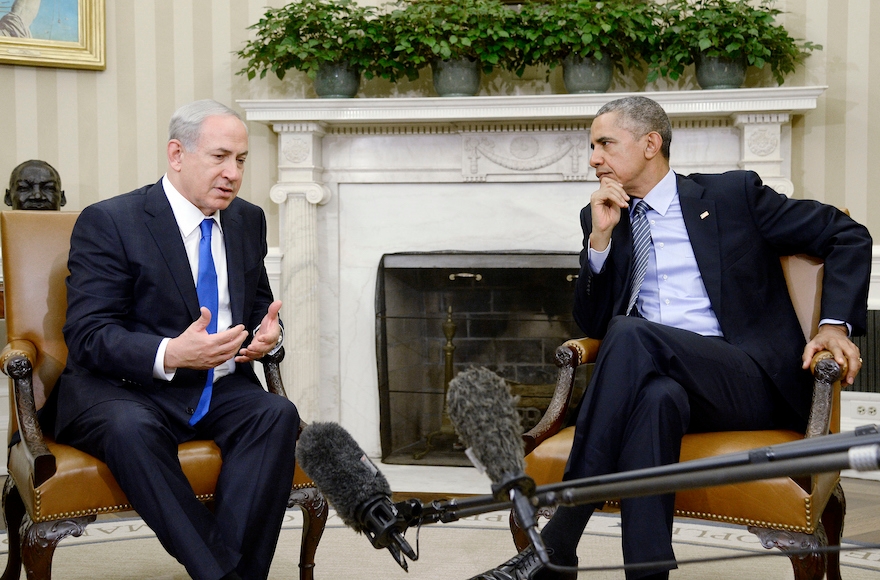WASHINGTON (JTA) — President Barack Obama told Israeli Prime Minister Benjamin Netanyahu that as “the African-American son of a single mother” he understands Israel’s harsh Middle Eastern reality.
The revelation of another wrinkle in the contentious relationship came during an extensive interview Obama gave Jeffrey Goldberg of the Atlantic that was posted online Thursday.
Obama describes his frustrations with world leaders, including Arab and Muslim leaders. In Netanyahu’s case, he says he believes Netanyahu might have been the leader to forge a peace deal with the Palestinians but is hemmed in by Israel’s politics.
“Bibi, you have to understand something,” Obama recalls telling Netanyahu after the Israeli prime minister launched into what Obama considered a “condescending” explanation of the ruthlessness of the Middle East. “I’m the African-American son of a single mother, and I live here, in this house. I live in the White House. I managed to get elected president of the United States. You think I don’t understand what you’re talking about, but I do.”
The leaders did not always disagree. Netanyahu, Goldberg writes, was the rare figure who agreed that Obama’s handling of the Syrian chemical weapons crisis was a success.
Obama’s major foreign policy frustration, Goldberg makes clear in the article, is that his 2013 decision to pull back from a threat to bomb Syria should it use chemical weapons against insurgents is, in the conventional wisdom, seen as a capitulation. Once it was clear Syria had used the weapons, Obama backed away from his pledge to strike and instead sought — but did not receive from Congress — a go-ahead to bomb. Subsequently, he worked with Russia to strip the Assad regime of its chemical weapons capabilities. Goldberg reports that Netanyahu described the deal as “the one ray of light in a very dark region.”
Obama acknowledges that his 2009 speech in Cairo addressing the Islamic world was not a success in that it did not spur reflection among some Muslims and Arabs about the reflexive tendency to blame Israel.
“My argument was this: Let’s all stop pretending that the cause of the Middle East’s problems is Israel,” he told Goldberg. “We want to work to help achieve statehood and dignity for the Palestinians, but I was hoping that my speech could trigger a discussion, could create space for Muslims to address the real problems they are confronting — problems of governance, and the fact that some currents of Islam have not gone through a reformation that would help people adapt their religious doctrines to modernity. My thought was, I would communicate that the U.S. is not standing in the way of this progress, that we would help, in whatever way possible, to advance the goals of a practical, successful Arab agenda that provided a better life for ordinary people.”
The speech, at the outset of both leaders’ terms, helped sour relations with Netanyahu, in part because Obama appeared to justify Israel’s existence by invoking the Holocaust, and also because Obama did not travel to neighboring Israel during the tour, something his closest advisers have since said was a mistake.
Obama also says for the first time that he would have struck Iran if it came close to nuclear breakout.
“I actually would have,” he told Goldberg, who has written in the past about the skepticism he has encountered among Israelis and some in the pro-Israel community, who believe Obama was bluffing. “If I saw them break out.”
Obama said striking Iran’s nuclear program “was in the category of an American interest.”
Instead, Iran and six major powers, led by the United States, agreed last year to a sanctions relief for nuclear rollback deal. Netanyahu believes the deal, while stripping Iran of its weapons capability for now, allows it to quickly resume its capability once some of the regimens in the deal lapse in 15 years.
JTA has documented Jewish history in real-time for over a century. Keep our journalism strong by joining us in supporting independent, award-winning reporting.






